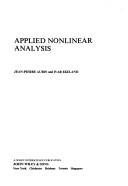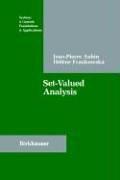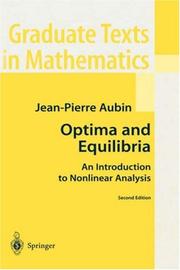| Listing 1 - 6 of 6 |
Sort by
|
Book
ISBN: 354007015X 038707015X 3662006383 9783540070153 9780387070155 Year: 1974 Volume: 102 Publisher: Berlin: Springer,
Abstract | Keywords | Export | Availability | Bookmark
 Loading...
Loading...Choose an application
- Reference Manager
- EndNote
- RefWorks (Direct export to RefWorks)
Mathematical control systems --- Operational research. Game theory --- Mathematical analysis --- CONVEX DOMAINS --- Congresses --- 330.105 --- Wiskundige economie. Wiskundige methoden in de economie --- Convex domains --- Congresses. --- 330.105 Wiskundige economie. Wiskundige methoden in de economie --- Analyse mathématique --- Algèbres convexes --- Congrès --- Mathematical analysis - Congresses --- CONVEX DOMAINS - Congresses
Book
ISBN: 0817635718 0817649093 9786612333163 128233316X 0817649107 3764335718 9780817635718 9783764335717 9780817649098 Year: 1991 Publisher: Boston (Mass.): Birkhäuser,
Abstract | Keywords | Export | Availability | Bookmark
 Loading...
Loading...Choose an application
- Reference Manager
- EndNote
- RefWorks (Direct export to RefWorks)
This work examines viability theory and its applications to control theory and differential games. The emphasis is on the construction of feedbacks and dynamical systems by myopic optimization methods. Systems of first-order partial differential inclusions, whose solutions are feedbacks, are constructed and investigated. Basic results are then extended to the case of fuzzy control problems, distributed control problems, and control systems with delays and memory. Aimed at graduate students and research mathematicians, both pure and applied, this book offers specialists in control and nonlinear systems tools to take into account general state constraints. Viability theory also allows researchers in other disciplines—artificial intelligence, economics, game theory, theoretical biology, population genetics, cognitive sciences—to go beyond deterministic models by studying them in a dynamical or evolutionary perspective in an uncertain environment. The book is a compendium of the state of knowledge about viability...Mathematically, the book should be accessible to anyone who has had basic graduate courses in modern analysis and functional analysis…The concepts are defined and many proofs of the requisite results are reproduced here, making the present book essentially self-contained. —Bulletin of the AMS Because of the wide scope, the book is an ideal reference for people encountering problems related to viability theory in their research…It gives a very thorough mathematical presentation. Very useful for anybody confronted with viability constraints. —Mededelingen van het Wiskundig Genootschap.
Differential inclusions. --- Feedback control systems. --- Set-valued maps. --- Differential inclusions --- Set-valued maps --- Feedback control systems --- Calculus --- Mathematics --- Physical Sciences & Mathematics --- Feedback mechanisms --- Feedback systems --- Many-valued mappings --- Mappings, Point-to-set --- Maps, Set-valued --- Multi-valued mappings --- Multivalued mappings --- Point-to-set mappings --- Inclusions, Differential --- Inclusions différentielles --- Systèmes à réaction --- Applications multivoques --- Inclusions différentielles --- Systèmes à réaction --- Mathematics. --- Artificial intelligence. --- Game theory. --- System theory. --- Biomathematics. --- Control engineering. --- Robotics. --- Mechatronics. --- Systems Theory, Control. --- Control, Robotics, Mechatronics. --- Game Theory, Economics, Social and Behav. Sciences. --- Mathematical and Computational Biology. --- Artificial Intelligence (incl. Robotics). --- Systems theory. --- Artificial Intelligence. --- Math --- Science --- AI (Artificial intelligence) --- Artificial thinking --- Electronic brains --- Intellectronics --- Intelligence, Artificial --- Intelligent machines --- Machine intelligence --- Thinking, Artificial --- Bionics --- Cognitive science --- Digital computer simulation --- Electronic data processing --- Logic machines --- Machine theory --- Self-organizing systems --- Simulation methods --- Fifth generation computers --- Neural computers --- Automation --- Biology --- Games, Theory of --- Theory of games --- Mathematical models --- Mechanical engineering --- Microelectronics --- Microelectromechanical systems --- Control engineering --- Control equipment --- Control theory --- Engineering instruments --- Programmable controllers --- Systems, Theory of --- Systems science --- Philosophy --- Automatic control.

ISBN: 0471059986 9780471059981 Year: 1984 Publisher: New York (N.Y.) : Wiley,
Abstract | Keywords | Export | Availability | Bookmark
 Loading...
Loading...Choose an application
- Reference Manager
- EndNote
- RefWorks (Direct export to RefWorks)
Mathematical control systems --- Functional analysis --- Analyse fonctionnelle --- Nonlinear functional analysis --- 517.988 --- Nonlinear theories --- Nonlinear functional analysis and approximation methods --- Nonlinear functional analysis. --- 517.988 Nonlinear functional analysis and approximation methods --- Analyse convexe --- Analyse fonctionnelle non linéaire --- Programmation (mathématiques)

ISBN: 0817634789 081764847X 9786612036200 1282036203 0817648488 9780817634780 9780817648473 Year: 1990 Volume: 2 Publisher: Boston (Mass.): Birkhäuser,
Abstract | Keywords | Export | Availability | Bookmark
 Loading...
Loading...Choose an application
- Reference Manager
- EndNote
- RefWorks (Direct export to RefWorks)
"An elegantly written, introductory overview of the field, with a near perfect choice of what to include and what not, enlivened in places by historical tidbits and made eminently readable throughout by crisp language. It has succeeded in doing the near-impossible—it has made a subject which is generally inhospitable to nonspecialists because of its ‘family jargon’ appear nonintimidating even to a beginning graduate student." —The Journal of the Indian Institute of Science "The book under review gives a comprehensive treatment of basically everything in mathematics that can be named multivalued/set-valued analysis. It includes…results with many historical comments giving the reader a sound perspective to look at the subject…The book is highly recommended for mathematicians and graduate students who will find here a very comprehensive treatment of set-valued analysis." —Mathematical Reviews "I recommend this book as one to dig into with considerable pleasure when one already knows the subject...'Set-Valued Analysis’ goes a long way toward providing a much needed basic resource on the subject." —Bulletin of the American Mathematical Society "This book provides a thorough introduction to multivalued or set-valued analysis...Examples in many branches of mathematics, given in the introduction, prevail [upon] the reader the indispensability [of dealing] with sequences of sets and set-valued maps…The style is lively and vigorous, the relevant historical comments and suggestive overviews increase the interest for this work...Graduate students and mathematicians of every persuasion will welcome this unparalleled guide to set-valued analysis." —Zentralblatt Math.
Set-valued maps --- Mathematics. --- Mathematical analysis. --- Analysis (Mathematics). --- Applied mathematics. --- Engineering mathematics. --- Game theory. --- System theory. --- Control engineering. --- Robotics. --- Mechatronics. --- Systems Theory, Control. --- Control, Robotics, Mechatronics. --- Analysis. --- Applications of Mathematics. --- Game Theory, Economics, Social and Behav. Sciences. --- Systems theory. --- Global analysis (Mathematics). --- Math --- Science --- Analysis, Global (Mathematics) --- Differential topology --- Functions of complex variables --- Geometry, Algebraic --- Games, Theory of --- Theory of games --- Mathematical models --- Mathematics --- 517.1 Mathematical analysis --- Mathematical analysis --- Mechanical engineering --- Microelectronics --- Microelectromechanical systems --- Engineering --- Engineering analysis --- Systems, Theory of --- Systems science --- Automation --- Machine theory --- Control engineering --- Control equipment --- Control theory --- Engineering instruments --- Programmable controllers --- Philosophy --- 517.1 --- 517.1 Introduction to analysis --- Introduction to analysis --- Many-valued mappings --- Mappings, Point-to-set --- Maps, Set-valued --- Multi-valued mappings --- Multivalued mappings --- Point-to-set mappings --- Mappings (Mathematics) --- Selection theorems --- Automatic control.

ISSN: 00725285 ISBN: 9783540649830 3540649832 364208446X 3662035391 Year: 1998 Volume: 140 Publisher: Berlin: Springer,
Abstract | Keywords | Export | Availability | Bookmark
 Loading...
Loading...Choose an application
- Reference Manager
- EndNote
- RefWorks (Direct export to RefWorks)
Advances in game theory and economic theory have proceeded hand in hand with that of nonlinear analysis and in particular, convex analysis. These theories motivated mathematicians to provide mathematical tools to deal with optima and equilibria. Jean-Pierre Aubin, one of the leading specialists in nonlinear analysis and its applications to economics and game theory, has written a rigorous and concise-yet still elementary and self-contained- text-book to present mathematical tools needed to solve problems motivated by economics, management sciences, operations research, cooperative and noncooperative games, fuzzy games, etc. It begins with convex and nonsmooth analysis,the foundations of optimization theory and mathematical programming. Nonlinear analysis is next presented in the context of zero-sum games and then, in the framework of set-valued analysis. These results are applied to the main classes of economic equilibria. The text continues with game theory: noncooperative (Nash) equilibria, Pareto optima, core and finally, fuzzy games. The book contains numerous exercises and problems: the latter allow the reader to venture into areas of nonlinear analysis that lie beyond the scope of the book and of most graduate courses. -(See cont. News remarks).
Nonlinear theories --- Mathematical analysis --- Economics, Mathematical --- Théories non linéaires --- Analyse mathématique --- Mathématiques économiques --- Game theory --- Equilibrium (Economics) --- Théories non linéaires --- Analyse mathématique --- Mathématiques économiques --- Functional analysis. --- Applied mathematics. --- Engineering mathematics. --- Mathematical analysis. --- Analysis (Mathematics). --- Economic theory. --- System theory. --- Calculus of variations. --- Functional Analysis. --- Applications of Mathematics. --- Analysis. --- Economic Theory/Quantitative Economics/Mathematical Methods. --- Systems Theory, Control. --- Calculus of Variations and Optimal Control; Optimization. --- Isoperimetrical problems --- Variations, Calculus of --- Maxima and minima --- Systems, Theory of --- Systems science --- Science --- Economic theory --- Political economy --- Social sciences --- Economic man --- 517.1 Mathematical analysis --- Engineering --- Engineering analysis --- Functional calculus --- Calculus of variations --- Functional equations --- Integral equations --- Philosophy --- Mathematics
Book
ISBN: 9782040188634 2040188630 Year: 1989 Publisher: Paris: Bordas,
Abstract | Keywords | Export | Availability | Bookmark
 Loading...
Loading...Choose an application
- Reference Manager
- EndNote
- RefWorks (Direct export to RefWorks)
| Listing 1 - 6 of 6 |
Sort by
|

 Search
Search Feedback
Feedback About UniCat
About UniCat  Help
Help News
News